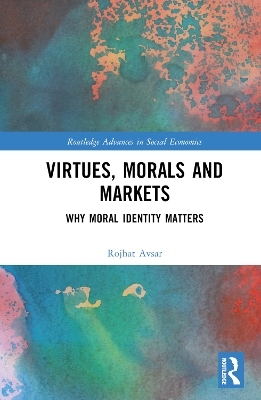
Virtues, Morals and Markets
Why Moral Identity Matters
Seiten
2024
Routledge (Verlag)
978-1-032-30022-1 (ISBN)
Routledge (Verlag)
978-1-032-30022-1 (ISBN)
Being oblivious to the motivational nuances behind human behavior could lead one to overlook the distinction that a good action does not always indicate a good character. Conversely, this book argues that such nuances are paramount, because motivational differences have fundamental implications for the welfare of the individual and society.
Being oblivious to the motivational nuances behind human behavior could lead one to overlook the distinction that a good action does not always indicate a good character. Conversely, this book argues that such nuances are paramount. Focusing on character over consequences is vital because motivational differences have fundamental implications for the welfare of the individual and society. Drawing on Aristotelian virtue ethics, the book argues that the utilitarian economic rhetoric, the rise of identity politics, and the growing commodification have allowed an illusion that moral and economic lives can be detached to take root in our culture. The book provides a robust philosophical argument articulating the inadequacy of the modern conception of morality (as a set of universal rules) that underlies economics and many modern-day institutions and aims to create a greater awareness of the connection between virtuous character and leading fulfilled lives. Integrating contemporary empirical findings with theoretical/philosophical insights, the book develops a coherent and convincing framework that could help transform the welfare ideology that underlies economic policies and modern institutions. This book is essential for anyone interested in questions of ethics in economics and related fields, including welfare economics, microeconomics, political economy, institutional economics, evolutionary economics, social economics, and behavioral economics.
Being oblivious to the motivational nuances behind human behavior could lead one to overlook the distinction that a good action does not always indicate a good character. Conversely, this book argues that such nuances are paramount. Focusing on character over consequences is vital because motivational differences have fundamental implications for the welfare of the individual and society. Drawing on Aristotelian virtue ethics, the book argues that the utilitarian economic rhetoric, the rise of identity politics, and the growing commodification have allowed an illusion that moral and economic lives can be detached to take root in our culture. The book provides a robust philosophical argument articulating the inadequacy of the modern conception of morality (as a set of universal rules) that underlies economics and many modern-day institutions and aims to create a greater awareness of the connection between virtuous character and leading fulfilled lives. Integrating contemporary empirical findings with theoretical/philosophical insights, the book develops a coherent and convincing framework that could help transform the welfare ideology that underlies economic policies and modern institutions. This book is essential for anyone interested in questions of ethics in economics and related fields, including welfare economics, microeconomics, political economy, institutional economics, evolutionary economics, social economics, and behavioral economics.
Rojhat Avsar is Associate Professor of Economics at Columbia College Chicago. His research interests include ethics, neuroscience, discourse analysis, behavioral economics, evolutionary psychology, and informal institutions. He is the author of Evolutionary Origins of Markets (Routledge, 2019) and numerous academic articles published in various outlets.
INTRODUCTION 1. MORAL IDENTITY 2. TRACING VIRTUE, SELF, AND EUDAIMONIA (εὐδαιμονία) IN THE BRAIN 3. MEASURING VIRTUES 4. MODELING A VIRTUOUS ECONOMY 5. VIRTUES AND MARKETS
| Erscheinungsdatum | 07.03.2024 |
|---|---|
| Reihe/Serie | Routledge Advances in Social Economics |
| Zusatzinfo | 6 Tables, black and white; 9 Line drawings, black and white; 10 Halftones, black and white; 19 Illustrations, black and white |
| Verlagsort | London |
| Sprache | englisch |
| Maße | 156 x 234 mm |
| Gewicht | 410 g |
| Themenwelt | Geschichte ► Teilgebiete der Geschichte ► Wirtschaftsgeschichte |
| Geisteswissenschaften ► Philosophie ► Ethik | |
| Geisteswissenschaften ► Psychologie ► Allgemeine Psychologie | |
| Wirtschaft ► Allgemeines / Lexika | |
| Wirtschaft ► Volkswirtschaftslehre ► Mikroökonomie | |
| ISBN-10 | 1-032-30022-1 / 1032300221 |
| ISBN-13 | 978-1-032-30022-1 / 9781032300221 |
| Zustand | Neuware |
| Informationen gemäß Produktsicherheitsverordnung (GPSR) | |
| Haben Sie eine Frage zum Produkt? |
Mehr entdecken
aus dem Bereich
aus dem Bereich
die Ukraine, Polen und der Irrweg in der russischen Geschichte
Buch | Hardcover (2023)
C.H.Beck (Verlag)
CHF 39,20
eine Globalgeschichte des Kapitalismus
Buch | Hardcover (2023)
C.H.Beck (Verlag)
CHF 53,20


